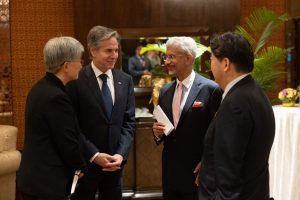The foreign ministers of the Quad countries — Australia’s Penny Wong, India’s S. Jaishankar, Japan’s Hayashi Yoshimasa, and the United States’ Antony Blinken — met in New Delhi a few days ago. The foreign ministers in their joint statement underscored their “steadfast commitment to supporting a free and open Indo-Pacific, which is inclusive and resilient.” The statement also noted their strong support for “the principles of freedom, rule of law, sovereignty and territorial integrity, peaceful settlement of disputes without resorting to threat or use of force and freedom of navigation and overflight, and oppos[ition to] any unilateral attempt to change the status quo, all of which are essential to the peace, stability and prosperity of the Indo-Pacific region and beyond.”
Following the devastating effects of the COVID-19 pandemic across the world, the four partners had expanded the focus of the Quad to non-security issues such as health security and vaccine diplomacy. However, it now appears that the Quad is regaining its security salience with the joint statement reiterating the importance of political and hard security issues, including maritime security, counterterrorism, and cyber security, though Humanitarian Assistance and Disaster Relief (HADR) continues on the agenda.
The four ministers also reaffirmed the importance of “the rules-based international order” which is “anchored in international law, including the U.N. Charter, and the principles of sovereignty, political independence, and territorial integrity of all states.” The joint statement also highlighted the development of a prosperous Indo-Pacific based on the prevalence of “peace and security in the maritime domain,” which can be accomplished only through “respect for sovereignty, consistent with international law, as reflected in the U.N. Convention on the Law of the Sea (UNCLOS), to meet challenges to the maritime rules-based order, including in the South and East China Seas.” The statement rejected unilateral actions to change the status quo and stroke tensions in the region as well as the “dangerous use” of maritime militia and coast guard vessels to perpetuate tensions as well as to violate the sanctity of maritime borders.
Though not mentioned by name, these are all clearly aimed at China’s behavior in the region.
In order to deal with the growing regional challenges, the Quad foreign ministers agreed to a number of additional steps that will be taken up within the Quad Maritime Security Working Group meeting, which will be hosted by the United States in Washington, D.C. later in the month. The statement also highlighted the work undertaken by the Indo-Pacific Partnership for Maritime Domain Awareness (IPMDA) in this regard.
Probably reflecting Indian concerns, the need for coordinated counterterrorism actions was also emphasized. In particular, the partners identified and condemned the Mumbai and Pathankot terror attacks. Reflecting Japanese concerns, the statement criticized North Korean actions, specifically its continued testing of long-range missiles and the abduction of Japanese citizens. There was also a clear effort to appeal to Southeast Asia, with attention to both the deteriorating situation in Myanmar and support for the ASEAN’s Five-Point Consensus and the broader ASEAN efforts at diffusing the crisis in Myanmar.
Ukraine is obviously a sore spot, with India unwilling to go along with its partners so far in condemning the Russian invasion of the country. But the partners appear to have found a way around their disagreements, opposing the use or threat of use of nuclear weapons and underscoring the need for a “comprehensive, just and lasting peace in Ukraine in accordance with international law, including the U.N. Charter.” Without naming Russia, the statement also “emphasized that the rules based international order must respect sovereignty, territorial integrity, transparency and peaceful resolution of disputes.” This was probably not ideal, but India at least agreed to the broad principles.
A careful reading of the joint statement issued by the Quad foreign ministers as well as the ministers’ first joint public appearance at the Raisina Dialogue, a flagship annual dialogue hosted by the Indian Ministry of External Affairs in partnership with the Observer Research Foundation (ORF), a public policy think tank in Delhi (full disclosure: I work at ORF) illustrated the increasing comfort among the four countries, and the increasing convergence of interests and perspectives. The Indian minister’s summing up of the panel discussion with an emphasis on maritime security at the heart of the Quad’s engagement reflects the growing seriousness of the Quad.
It is relatively easy to establish coalitions to work on non-traditional security issues but nurturing a group to focus on security issues as the core is not easy, especially for countries like India. The other three Quad partners already have a number of concrete security arrangements that will further the security agenda in managing China as well as in ensuring a free and open Indo-Pacific.
The message of united determination was clearly heard in China, which responded along expected lines to say that state to state engagements should be for peace and development, rather than creating “exclusionary blocs.” Russian Foreign Minister Sergei Lavrov used the Raisina platform to criticize the Quad as well as the AUKUS and the broader West, saying the West is pushing a certain agenda, playing one against the other.
Even though the Quad ministers’ joint statement did not call out Russia by name, the statement called for respect for international law and a rules-based order, sovereignty and territorial integrity, and “just and lasting peace in Ukraine” which is clearly indicative of who to blame for the invasion of Ukraine. That the statement did not call on Ukraine to restrain itself again demonstrates who the partners think is to blame for the conflict and human suffering it has caused. This is a slight but significant shift from India’s traditional stand calling on both parties to exercise restraint.

































